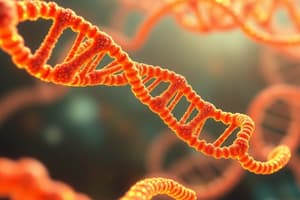Podcast
Questions and Answers
Qual é o processo responsável pela síntese de proteínas?
Qual é o processo responsável pela síntese de proteínas?
Qual a importância das proteínas para os organismos?
Qual a importância das proteínas para os organismos?
Qual a função principal das proteínas transportadoras?
Qual a função principal das proteínas transportadoras?
Qual é uma característica das proteínas estruturais?
Qual é uma característica das proteínas estruturais?
Signup and view all the answers
Qual é um exemplo de proteína relacionada à sinalização celular?
Qual é um exemplo de proteína relacionada à sinalização celular?
Signup and view all the answers
O que pode causar problemas de saúde como anemia, distúrbios da pele e função imunológica comprometida?
O que pode causar problemas de saúde como anemia, distúrbios da pele e função imunológica comprometida?
Signup and view all the answers
Qual é a estrutura primária de uma proteína?
Qual é a estrutura primária de uma proteína?
Signup and view all the answers
Qual é uma das funções principais das proteínas no corpo humano?
Qual é uma das funções principais das proteínas no corpo humano?
Signup and view all the answers
Que tipo de estrutura das proteínas é representada pelas alfa-hélices e folhas beta?
Que tipo de estrutura das proteínas é representada pelas alfa-hélices e folhas beta?
Signup and view all the answers
Onde ocorre a síntese de proteínas no interior da célula?
Onde ocorre a síntese de proteínas no interior da célula?
Signup and view all the answers
Qual é a importância das proteínas no sistema imunológico?
Qual é a importância das proteínas no sistema imunológico?
Signup and view all the answers
Em que principal processo biológico as enzimas, um tipo de proteína, estão envolvidas?
Em que principal processo biológico as enzimas, um tipo de proteína, estão envolvidas?
Signup and view all the answers
Study Notes
Proteínas are complex biomolecules that play essential roles in the structure, function, and regulation of all living organisms. They are composed of long chains of amino acids, which are linked by peptide bonds. Proteins are involved in various biological processes, including catalysis, structural support, cell signaling, and immunity.
Estrutura das Proteínas
Proteins have a unique three-dimensional structure that determines their function. The primary structure of a protein is the sequence of amino acids, which is determined by the genetic code. The secondary structure is the local conformation of the polypeptide chain, such as alpha-helices and beta-sheets. The tertiary structure is the overall conformation of the protein, including its folded state. Proteins can also form quaternary structures, where multiple polypeptide chains come together to form a functional complex.
Funções das Proteínas
Proteins have a wide range of functions in the body. One of the most well-known functions is as enzymes, which catalyze biochemical reactions. Proteins also serve as structural components, providing support and maintaining the integrity of cells and tissues. They are involved in cell signaling and messaging, regulating various cellular processes. Proteins are also important in the immune system, where they help to recognize and neutralize pathogens, and in blood clotting, where they help to form blood clots.
Síntese de Proteínas
Proteins are synthesized through the process of translation, which occurs in the ribosome. The genetic information in DNA is transcribed into mRNA, which is then translated into a sequence of amino acids. The amino acids are linked together by ribosomes, which read the mRNA and add amino acids according to the genetic code. The protein is then folded into its final shape, which is crucial for its function.
Importância das Proteínas
Proteins are essential for life, and their functions are critical to the survival and health of organisms. They play a role in growth, development, and repair, and are involved in nearly every biological process. Protein deficiency can lead to a variety of health problems, including anemia, skin disorders, and impaired immune function.
Tipos de Proteínas
There are many different types of proteins, each with its own unique structure and function. Some common types include:
- Enzymes: These proteins catalyze biochemical reactions, breaking down or building up other molecules.
- Structural proteins: These proteins provide support and maintain the structure of cells and tissues, such as collagen and elastin.
- Transport proteins: These proteins help to move molecules and ions around the body, such as hemoglobin and albumin.
- Signaling proteins: These proteins are involved in cell signaling and messaging, such as receptors and signaling molecules.
- Immunoproteins: These proteins are part of the immune system, such as antibodies and complement proteins.
In conclusion, proteins are complex biomolecules that play essential roles in the structure, function, and regulation of living organisms. They are composed of long chains of amino acids, and their unique three-dimensional structure determines their function. Proteins are involved in various biological processes, including catalysis, structural support, cell signaling, and immunity. They are synthesized through the process of translation, and their functions are critical to the survival and health of organisms.
Studying That Suits You
Use AI to generate personalized quizzes and flashcards to suit your learning preferences.
Description
Este quiz aborda a estrutura, síntese, funções e importância das proteínas, moléculas essenciais para os organismos vivos. Aprenda sobre a sequência de aminoácidos, estruturas secundárias e terciárias, e os diversos papéis das proteínas no corpo humano.





